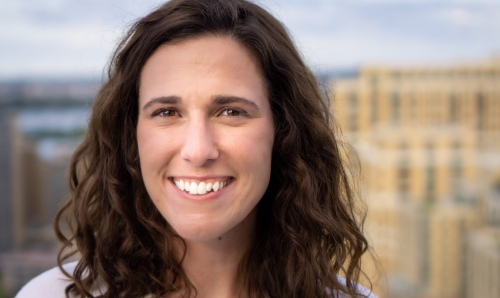Emily Buehler
Social Research Methods and Statistics MSc (2016); PhD Criminology (2019)
Emily is a Statistician at the Bureau of Justice Statistics for the United States Federal Government. She talks about what she does now and how she got there following her time at Manchester.
My current role and how I got there

I manage national criminal justice-related data collections for the United States Federal Government. The programs I oversee include a census of law enforcement basic training academies, a survey of sexual victimization in adult correctional and juvenile justice facilities, and an administrative data collection of public expenditures and employment in the criminal justice sector.
As part of my role, I am involved in the entire lifecycle of the data collection from planning through publication. This includes survey sampling and design, questionnaire development, fielding the questionnaire, data cleaning and analysis, and writing reports.
My current job is one that I had dreamed of since I was an undergraduate - a career providing national statistics on criminal justice topics is exactly what I had hoped for when I embarked on a journey of postgraduate courses in Social Research Methods and Statistics and Criminology. Since I was an undergraduate, I wanted a career that used quantitative methods to explore topics in criminology. At Manchester, I chose a Master’s course that provided me with a good foundation in research skills. My PhD has allowed me to use those skills to investigate a topic in the field of Criminology that I found interesting - how incarcerated individuals use cognitive skills as part of their prison-based work experiences.
My course allowed me to develop my research, communication, and professional skills while also increasing my knowledge on a variety of criminal justice topics. My role as a civil service statistician is one in which a PhD, while not mandatory, provided me with an extra boost in the application process. I also think the skills and experience from my course set me up to progress quickly through my organization and I have been able to demonstrate to the leadership of my agency that I could handle complex tasks and projects.
My experience at Manchester
I chose The University of Manchester for my Master's because I was drawn to a programme that focused on the use of statistical methods to study social science topics. I wanted an education that would prepare me with strong methodological and research skills. I was drawn to Manchester for the characteristics of the city itself. There are loads of great restaurants and cafes, music venues, and festivals and events all year round.
During my Master's programme, I decided I wanted to put these skills to further use as part of a PhD. My decision to pursue a PhD was an easy one, I submitted a proposal for a funded project from the School of Law (at the time, now the Department of Criminology) and was successful in my application.
My time at Manchester also influenced me in deciding what I did not want to do, which sometimes I think is just as important in figuring out what you do what to do for a career. Having had experiences as a teaching assistant and working closely with other academics at Manchester, I decided that a career in academia was not what I wanted. Whilst it is sometimes a natural path after finishing a PhD to become a lecturer or pursue a postdoc, I did not feel that was the right choice for
my interests nor was it in line with the type of structure and job security I was looking for. I think students should be open to using their postgraduate degrees in the private or third sector or in civil service roles. There are so many ways to make an impact and pursue one’s passions and interests without necessarily needing to work at a university.
My advice for future students
I think it is important for potential master's students to do research on the specific modules offered as part of a course, as these will form the backbone of their education and shape their path and interests related to their Master’s dissertation.
I would encourage students to take advantage of the numerous societies and groups on campus to develop their personal and academic interests. As an international student, I joined the Run Wild MCR and Manchester Hiking Society groups. Through these groups, I was able to meet people and explore the city and surrounding areas by doing activities I enjoy. It also gave me the confidence to later explore on my own - for instance, planning my own hiking trips based on learning about parks and trails through the hiking society.
I would also suggest students get involved in academic societies and events. As a postgraduate research student, I would recommend attending workshops and events as well as presenting in seminar series for your department or school. These could be places where you make a connection with other researchers or academics and places where you discover new passions or ideas.
